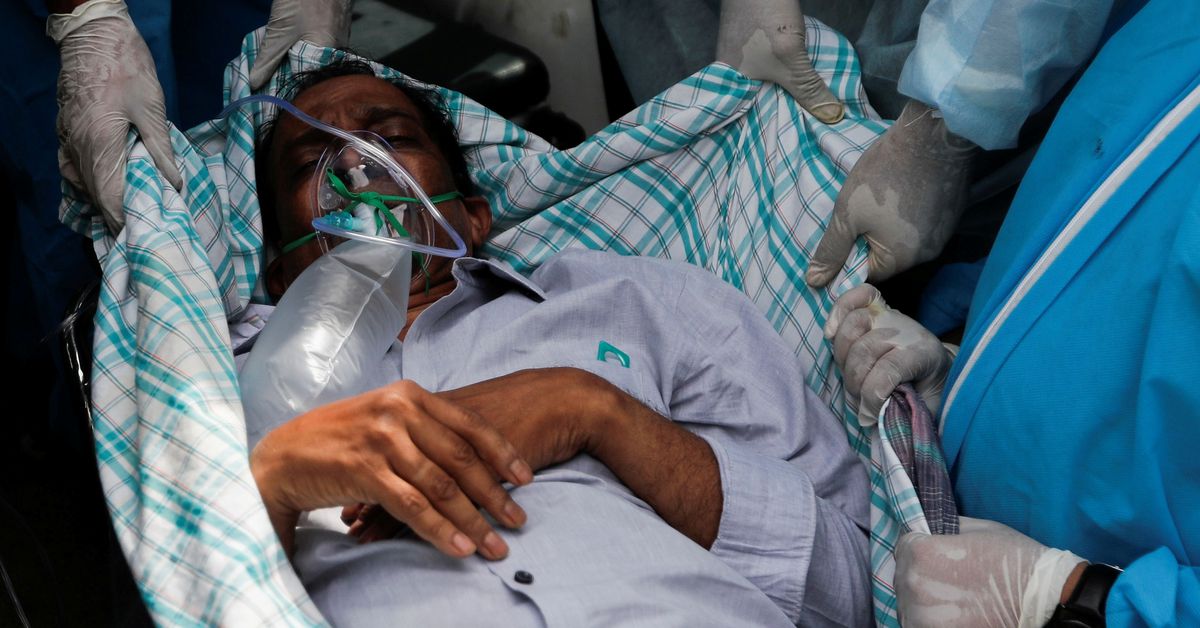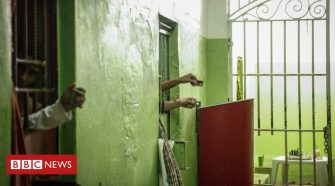India reported the world’s highest daily tally of coronavirus infections for a second day on Friday, surpassing 330,000 new cases, as it struggles with a health system overwhelmed by patients and plagued by accidents.
Deaths in the past 24 hours also jumped to a record 2,263, the health ministry said, while officials across northern and western India, including the capital, New Delhi, warned most hospitals were full and running out of oxygen.
The surge in cases came as a fire in a hospital in a suburb of Mumbai treating COVID-19 patients killed 13 people, the latest accident to hit a facility crowded with virus sufferers.
On Wednesday, 22 patients died at a public hospital in the western state of Maharashtra when their oxygen supply ran out due to a leaking tank, after at least nine more died in a hospital fire last month in the state’s capital of Mumbai.
“It is grim. It is grave … there is an extreme shortage of ICU beds,” T.S. Singh Deo, health minister of the eastern state of Chhattisgarh, told Reuters.
“We’ll need to be very careful in the rural areas. If it spreads there, then it will be out of control.”
Prime Minister Narendra Modi, whose government has been criticised for relaxing virus curbs too soon, met chief ministers of the worst-affected states, including the capital Delhi, Maharashtra and Modi’s home state of Gujarat, to discuss the crisis.
Health Minister Harsh Vardhan said this week people had largely given up COVID precautions and “became very careless” before the surge.
Daily infections hit 332,730, up from 314,835 the previous day when India set a record that surpassed one set by the United States in January, of 297,430 new cases. The U.S. tally has since fallen.
Delhi reported more than 26,000 new cases and 306 deaths, or about one fatality every five minutes, the fastest since the pandemic began.
Medical oxygen and beds have become scarce, with major hospitals putting up notices saying they have no room for any more patients and police fanning out to secure oxygen supplies. read more
“We regret to inform that we are suspending any new patient admissions in all our hospitals in Delhi … till oxygen supplies stabilise,” Max Healthcare, which runs a network of hospitals, said on Twitter as it appealed for oxygen.
Bhramar Mukherjee, a professor of biostatistics and epidemiology at the University of Michigan in the United States, said it now seemed as if there was no social safety net for Indians.
“Everyone is fighting for their own survival and trying to protect their loved ones. This is hard to watch,” he said.
‘SELF-ASSURED HUBRIS’
In New Delhi, people losing loved ones are turning to makeshift facilities that are undertaking mass burials and cremations as funeral services get swamped. read more
Amid the despair, recriminations have begun.
Health experts say India got complacent in the winter, when new cases were running at about 10,000 a day and seemed to be under control, and lifted restrictions to allow big gatherings.
“Indians let down their collective guard,” Zarir Udwadia, a pulmonologist on Maharashtra’s task force, wrote in the Times of India newspaper.
“We heard self-congratulatory declarations of victory from our leaders, now cruelly exposed as mere self-assured hubris.”
The government ordered an extensive lockdown last year in the early stages of the pandemic, but it has been wary of the economic costs and upheaval to the lives of legions of poor migrant workers after any tight reimposition of curbs.
Modi has said another lockdown would be a last resort.
A more infectious variant of the virus that originated in India may have helped accelerate the surge, experts said.
Britain, Canada, Singapore and the United Arab Emirates have banned flights from India. read more
India, a major producer of vaccines, has begun a vaccination campaign but only a tiny fraction of a population of 1.39 billion has received a dose, with experts saying supplies are scarce.
“It is tragic, the mismanagement,” Kaushik Basu, a professor at Cornell University and a former economic adviser to the Indian government, said on Twitter.
“For a country known to be the pharmacy of the world, to have less than 1.5% of the population vaccinated is a failure difficult to fathom.”
Our Standards: The Thomson Reuters Trust Principles.















